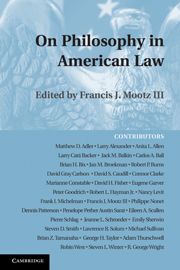Book contents
- Frontmatter
- Contents
- Introduction
- PART I KARL LLEWELLYN AND THE COURSE OF PHILOSOPHY IN AMERICAN LAW
- PART II PHILOSOPHICAL PERSPECTIVES ON LAW
- PART III AREAS OF PHILOSOPHY AND THEIR RELATIONSHIP TO LAW
- PART IV PHILOSOPHICAL EXAMINATIONS OF LEGAL ISSUES
- PART V LAW, RHETORIC, AND PRACTICE THEORY
- PART VI QUESTIONING THE RELATIONSHIP BETWEEN PHILOSOPHY AND AMERICAN LAW
- 28 Law and Philosophy at Odds
- 29 Jurisprudence: Beyond Extinction?
- 30 Law and Philosophy in the Hyperreal
- 31 Philosophy? In American Law?
- PART VII COMMENTARIES
- Contributors and Selected Bibliography
- Name Index
- References
28 - Law and Philosophy at Odds
Published online by Cambridge University Press: 31 July 2009
- Frontmatter
- Contents
- Introduction
- PART I KARL LLEWELLYN AND THE COURSE OF PHILOSOPHY IN AMERICAN LAW
- PART II PHILOSOPHICAL PERSPECTIVES ON LAW
- PART III AREAS OF PHILOSOPHY AND THEIR RELATIONSHIP TO LAW
- PART IV PHILOSOPHICAL EXAMINATIONS OF LEGAL ISSUES
- PART V LAW, RHETORIC, AND PRACTICE THEORY
- PART VI QUESTIONING THE RELATIONSHIP BETWEEN PHILOSOPHY AND AMERICAN LAW
- 28 Law and Philosophy at Odds
- 29 Jurisprudence: Beyond Extinction?
- 30 Law and Philosophy in the Hyperreal
- 31 Philosophy? In American Law?
- PART VII COMMENTARIES
- Contributors and Selected Bibliography
- Name Index
- References
Summary
In addressing the topic of this symposium – philosophy in American law – we give the term philosophy a meaning different from that given by Llewellyn in his article “On Philosophy in American Law.” Llewellyn described philosophy as something akin to an ideology or decision-making ethos, which will vary over time according to the interests of decision makers and the needs of society. In contrast, we have in mind a discipline that employs reason to bring clarity, depth, and precision to the process of thinking about a given subject.
Given our understanding of the term philosophy, the role of philosophy in law may seem obvious. Legal decision making is supposed to be a reasoned enterprise. Judges, in particular, are supposed to decide cases for reasons and to give reasons for their decisions. Surely philosophical methods, employed by judges and the lawyers who argue before them, will improve the quality of the process.
We shall argue that, in fact, legal decision makers may sometimes do better without the insights of philosophy. Law is a reasoned enterprise, but it is also a rule-governed enterprise. For reasons we shall develop, thorough and meticulous reasoning can undermine the benefits of legal rules. Philosophy is fine for observers of law but not necessarily good for its participants.
In sections that follow, we shall elaborate this point in the context of two practices that are integral to law: general compliance with legal rules and judicial decision making by analogy.
- Type
- Chapter
- Information
- On Philosophy in American Law , pp. 241 - 248Publisher: Cambridge University PressPrint publication year: 2009

